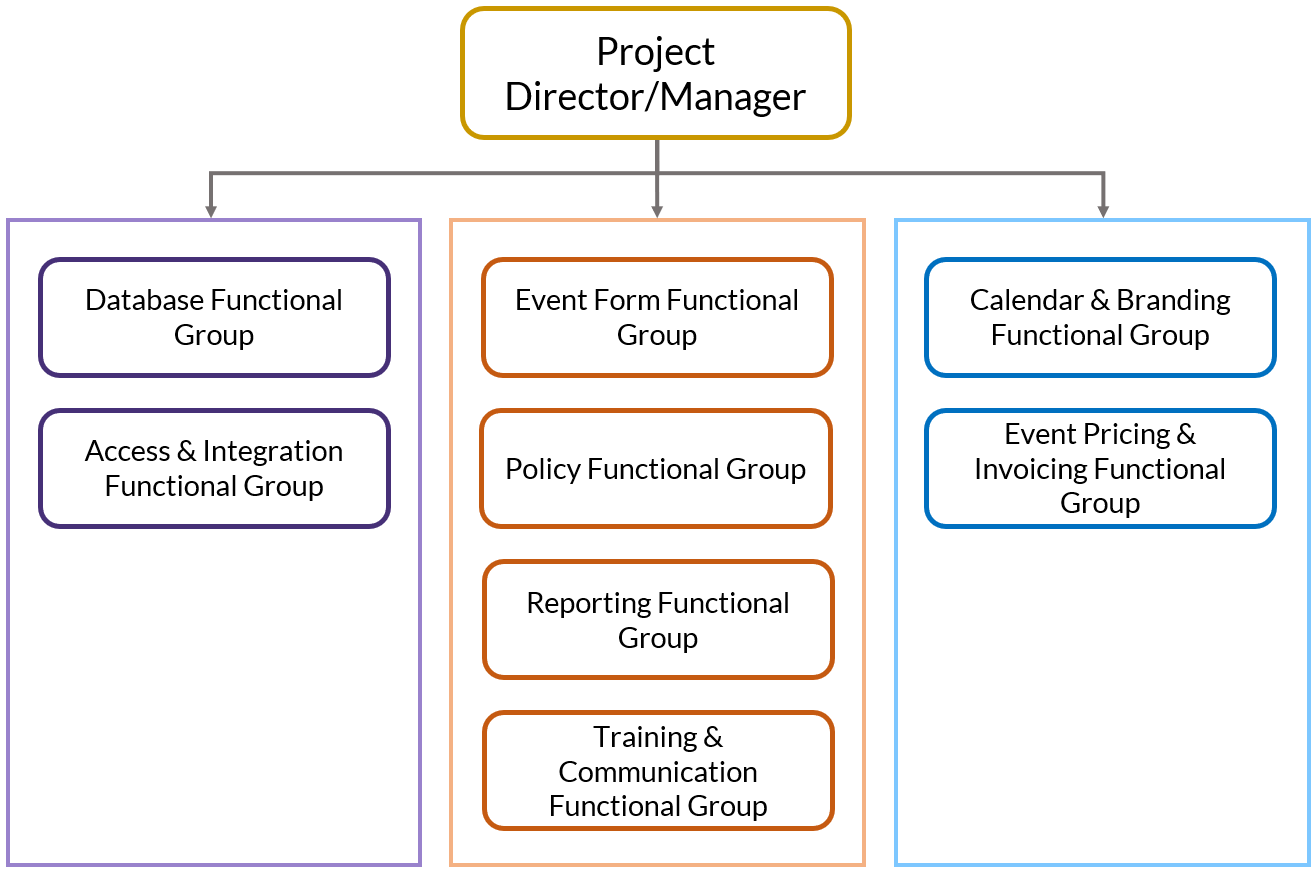To achieve the specific goals and objectives for the campuswide implementation of 25Live, seven critical project functional groups have been established and will be led by subject matter experts. With the support of the Quality Assurance (QA) team, Functional Group Leaders will oversee and report on the progress of each focus group. Every group, whether they are involved in configuring the event scheduling database, enhancing user experience, or resolving technical issues, plays a critical role in implementing a robust and user-friendly tool that will streamline the event scheduling process for the campus.

Text Version - 25Live Functional Groups
- Project Director/Manager
- Database Functional Group
- Access & Integration Functional Group
- Event Form Functional Group
- Policy Functional Group
- Reporting Functional Group
- Calendar & Branding Functional Group
- Event Pricing & Invoicing Functional Group
Definitions
- The Project Director/ Manager works collaboratively with workgroups that specialize in broad aspects of event scheduling and campus technologies.
- Functional Group: a small group of subject matter experts to perform research, develop recommendations, or other activities in support of a larger goal.
Focus Groups
Each functional group consists of one or more focus groups, with team members identified based on their expertise and knowledge in designated areas to ensure comprehensive coverage and strategies. Focus groups will aid in gathering and consolidating information in alignment with their goals and objectives. For more details, please refer to the Functional Group List.
Functional Groups Leaders: Jesús Garcia and the Quality Assurance team
| Focus Group Name | Focus Group Leader | Goals and Objectives |
|---|---|---|
| Event Space and Feature Focus Group | Jesús Garcia |
|
| Resources and Features Inventory Focus Group | Nicole Lange |
|
Functional Groups Leaders: Dania Russell and Aaron Benn
| Focus Group Name | Focus Group Leader | Goals and Objectives |
|---|---|---|
| Event Process and Workflow Focus Group | Dania Russell and Aaron Benn |
|
Functional Groups Leaders: Dania Russell and Mike Beatty
| Focus Group Name | Focus Group Leader | Goals and Objectives |
|---|---|---|
| Event Scheduling Policy and Guideline Focus Group | Dania Russell |
|
| Escalation Process Focus Group | Mike Beatty |
|
Functional Groups Leaders: Michelle Anolin/Michelle Tagay Dacoco and the Quality Assurance team
| Focus Group Name | Focus Group Leader | Goals and Objectives |
|---|---|---|
| Access and Security Focus Group | Michelle Anolin |
|
| Integration Focus Group | Michelle Anolin and Michelle Tagay Dacoco |
|
Functional Groups Leaders: Dania Russell and Nicholas Holmes
| Focus Group Name | Focus Group Leader | Goals and Objectives |
|---|---|---|
| Space Utilization and Safety Focus Group | Nicholas Holmes |
|
Functional Groups Leaders: Jesús Garcia and Barbara Stein
| Focus Group Name | Focus Group Leader | Goals and Objectives |
|---|---|---|
| Calendar Focus Group | Jesús Garcia and Barbara Stein |
|
| Branding Focus Group | Barbara Stein |
|
Functional Groups Leaders: Dania Russell and Aaron Benn
| Focus Group Name | Focus Group Leader | Goals and Objectives |
|---|---|---|
| Rate Focus Group | Dania Russell |
|
| Cost Recovery Focus Group | Yessica Gonzalez-Gudino |
|
Functional Groups Leaders: Jesús Garcia and the Quality Assurance team
| Focus Group Name | Focus Group Leader | Goals and Objectives |
|---|---|---|
| Training Focus Group | Quality Assurance |
|
| Communication Focus Group | Jesús Garcia |
|
This page will continue to be updated as we progress with the event scheduling implementation.